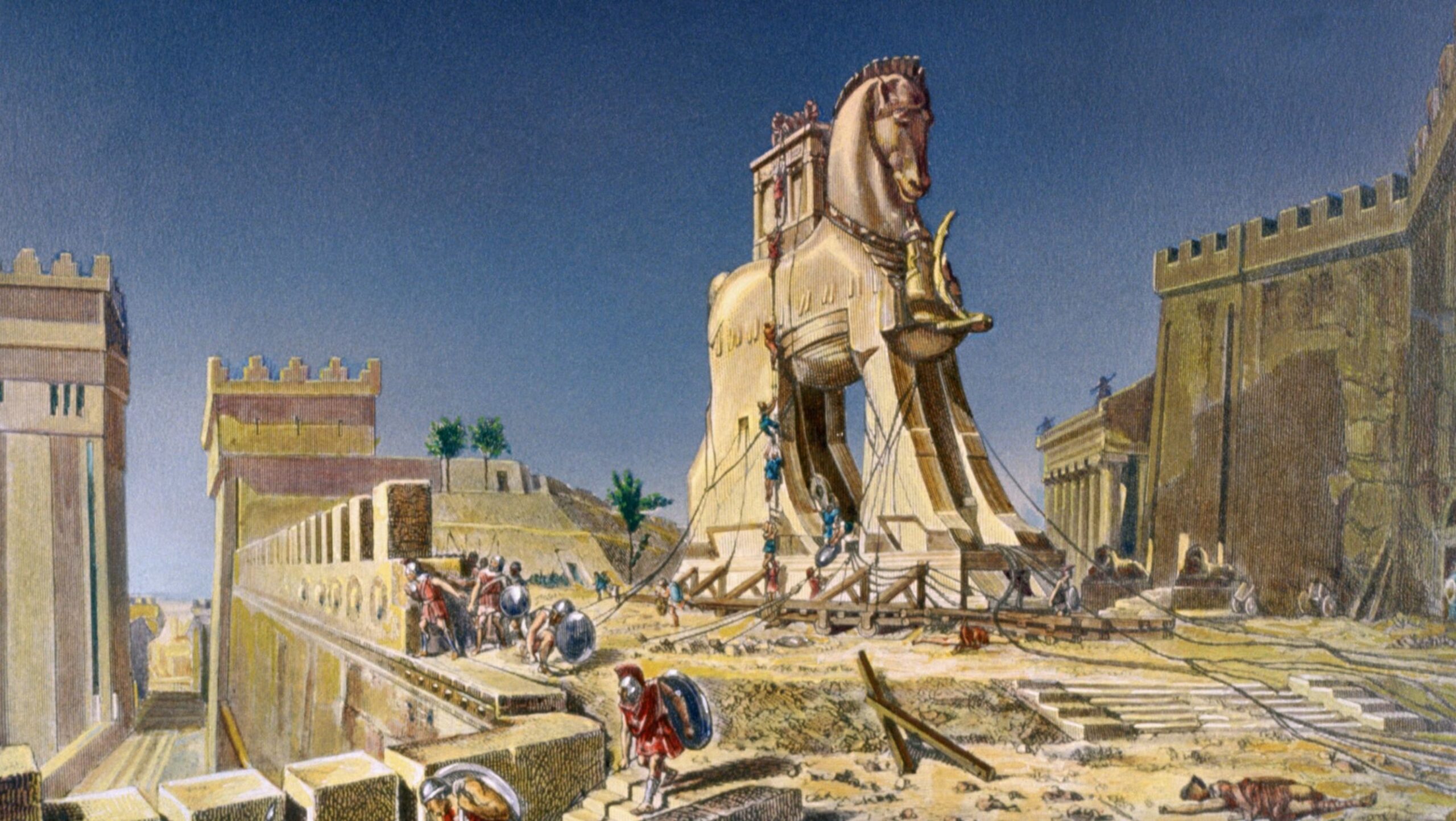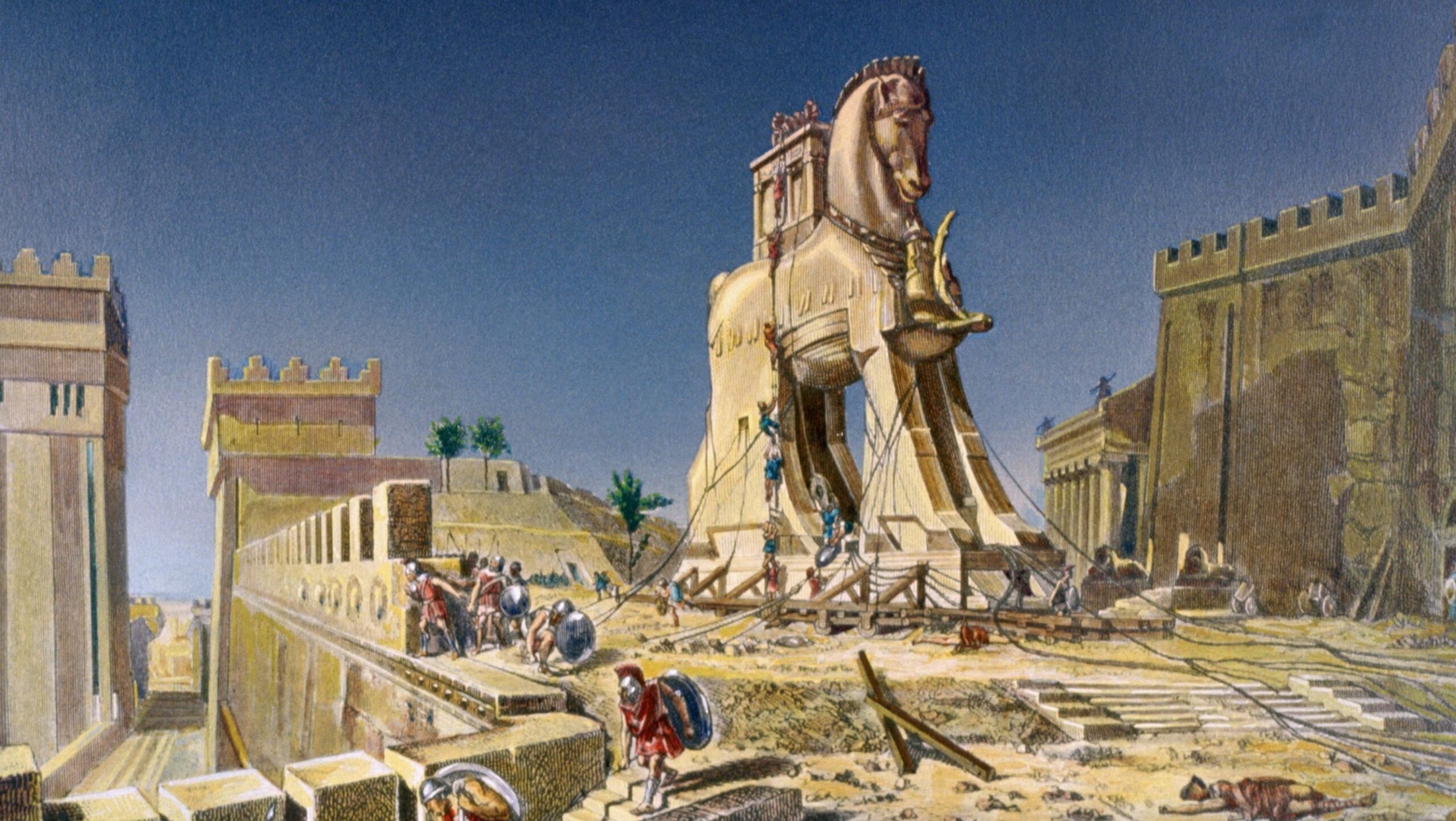Ready for a trip back in time? I want to tell you the story of one of the greatest wars in ancient history – the Trojan War Summary. It’s a tale of love, betrayal, and bravery that’s been passed down for generations. The war began when Paris, a Trojan prince, stole Helen, the beautiful wife of Menelaus, king of Sparta. This sparked a decade-long conflict between the Greeks and the Trojans that would change the course of history.
The Trojan War is more than just a battle between two armies. It’s a story of gods and goddesses, heroes and villains, and the power of fate. From the mighty Achilles to the cunning Odysseus, the characters in this epic tale have captured the imaginations of people for centuries. So, let’s dive into the world of the Trojan War and discover the secrets behind this legendary conflict.
Table of Contents:
- The Trojan War: A Summary of the Epic Conflict
- The Sequence of Events in the Trojan War
- The Fall of Troy and the Trojan Horse
- The Aftermath and Legacy of the Trojan War
- Conclusion
The Trojan War: A Summary of the Epic Conflict

The Trojan War is one of the most famous events in Greek mythology, and its story has been told for centuries. It’s a tale of love, betrayal, and the power of the gods. The war began when Paris, a Trojan prince, abducted Helen, the wife of Menelaus, king of Sparta. This act of betrayal sparked a conflict that would last for ten years and involve some of the greatest heroes of ancient Greece.
The Cause of the War: Trojan War Summary
The roots of the Trojan War can be traced back to a single event: the judgment of Paris. The story goes that the goddess Eris, angry at not being invited to a wedding, threw a golden apple inscribed with the words “to the fairest” among the guests. Three goddesses – Hera, Athena, and Aphrodite – claimed the apple, and Zeus, the king of the gods, chose Paris to decide who should receive it.
The Main Characters Involved
The Trojan War involved many of the greatest heroes of Greek mythology. On the Greek side, there was Achilles, the greatest warrior of his time; Odysseus, known for his cunning and intelligence; and Agamemnon, the leader of the Greek forces and brother of Menelaus. On the Trojan side, there was Hector, the greatest of the Trojan warriors and the son of King Priam; Paris, whose actions sparked the war; and Aeneas, a Trojan hero who would go on to found the city of Rome.
The Role of the Gods
The gods played a significant role in the Trojan War, with different deities taking sides and intervening in the conflict. Athena, Hera, and Poseidon supported the Greeks, while Aphrodite, Ares, and Apollo favored the Trojans. The gods often intervened directly in the fighting, with Athena giving Achilles a magical shield and Apollo guiding the arrows of the Trojan archer Paris. The involvement of the gods added an element of divine destiny to the war, with the outcome seen as the will of the gods rather than the result of human actions alone.
The Sequence of Events in the Trojan War: Trojan War Summary
The Trojan War lasted for ten years and involved many battles and skirmishes. The war began with the gathering of the Greek forces and ended with the fall of Troy and the return of the Greek heroes to their homes.
The Gathering of the Greek Forces
When Menelaus learned of his wife’s abduction, he called upon the other Greek kings to honor their oaths and join him in a war against Troy. The Greek forces gathered at Aulis, where they sacrificed to the gods and prepared for the journey across the Aegean Sea. The fleet consisted of over a thousand ships, with each king bringing his own forces and supplies.
The First Nine Years of Battle
Inconclusive battles and skirmishes marked the first nine years of the Trojan War. The Greeks besieged the city of Troy, but the Trojans, led by Hector, defended their city and kept the Greeks at bay. During this time, many of the famous events of the war took place, such as the duel between Menelaus and Paris, the death of Patroclus, and Achilles’s rage.
The Events of the Final Year: Trojan War Summary
In the tenth and final year of the war, the tide turned in favor of the Greeks. Achilles, angered by the death of his friend Patroclus, returned to battle and killed Hector. The Trojans, demoralized by the loss of their greatest warrior, began to lose hope. It was at this point that Odysseus devised the plan that would lead to the fall of Troy: the famous Trojan Horse.
The Fall of Troy and the Trojan Horse: Trojan War Summary

The story of the Trojan Horse is one of the most famous episodes in the Trojan War. It was a brilliant plan that allowed the Greeks to finally defeat the Trojans and end the war.
Odysseus’ Plan
Odysseus, known for his cunning, devised a plan to infiltrate Troy using a large wooden horse. He suggested that the Greeks build a hollow wooden horse large enough to hold a group of soldiers. The rest of the Greek army would pretend to sail away, leaving the horse behind as an offering to the gods.
The Trojans’ Fatal Mistake: Trojan War Summary
When the Trojans discovered the horse, they believed it to be a peace offering from the Greeks. Despite the warnings of Cassandra and Laocoön, who suspected a trick, the Trojans decided to bring the horse into their city as a trophy of their victory. This proved to be a fatal mistake, as the horse was filled with Greek soldiers who emerged at night and opened the gates of Troy, allowing the rest of the Greek army to enter the city.
The Greeks’ Victory
With the Greek army inside the city, the Trojans were quickly overwhelmed. The Greeks burned and looted the city, killing many of the Trojan men and enslaving the women and children. King Priam was killed, and the city was left in ruins. The Trojan War had ended with a decisive Greek victory.
The Aftermath and Legacy of the Trojan War: Trojan War Summary
The Trojan War had a significant impact on Greek culture and literature. The stories of the war and its heroes were passed down through generations and became the subject of countless works of art and literature.
The Homecoming of the Greek Heroes
After the fall of Troy, the Greek heroes began their long journey home. For some, like Odysseus, the journey was filled with obstacles and challenges. Odysseus’ journey home to Ithaca took ten years and is the subject of Homer’s epic poem, the Odyssey. Other heroes, like Agamemnon, met tragic ends upon their return home.
The Trojan Survivors: Trojan War Summary
Not all of the Trojans perished in the war. Some, like Aeneas, managed to escape the city and set out to find a new home. According to Roman mythology, Aeneas and his followers eventually settled in Italy, where they became the ancestors of the Roman people. The story of Aeneas’ journey is told in Virgil’s epic poem, the Aeneid.
The Influence on Literature and Art
The Trojan War has had a lasting impact on Western literature and art. The stories of the war and its heroes have inspired countless works, from ancient Greek poetry to modern novels and films. The Iliad and the Odyssey, two epic poems attributed to the ancient Greek poet Homer, are perhaps the most famous works inspired by the war. These poems have been studied and admired for centuries and continue to influence writers and artists to this day. The Trojan War has also been the subject of many works of art, from ancient Greek vases to modern paintings and sculptures.
The story of the Trojan War is a timeless tale of love, betrayal, and the power of the gods. It continues to captivate audiences and inspire new interpretations, ensuring that the legacy of the war and its heroes will endure for generations to come.
Key Takeaway: Trojan War Summary
The Trojan War, sparked by Paris abducting Helen, involved legendary heroes and gods on both sides. It lasted ten years, ending with the Greeks’ cunning use of the Trojan Horse to infiltrate and destroy Troy.
Conclusion: Trojan War Summary
The Trojan War may have ended thousands of years ago, but its legacy lives on. The stories of heroes like Achilles and Hector continue to inspire us, reminding us of the courage and sacrifice that defined this epic conflict. The fall of Troy, brought about by the legendary Trojan Horse, has become a symbol of the power of cunning and strategy in warfare.
But the Trojan War is more than just a military campaign. It’s a story of love, honor, and the complex relationships between gods and mortals. It’s a reminder that even in the midst of chaos and destruction, there is still room for compassion, loyalty, and hope.
So the next time you hear someone mention the Trojan War, remember the heroes who fought, the lovers who sacrificed, and the gods who watched from above. This epic tale may be ancient, but its themes and lessons are timeless.

